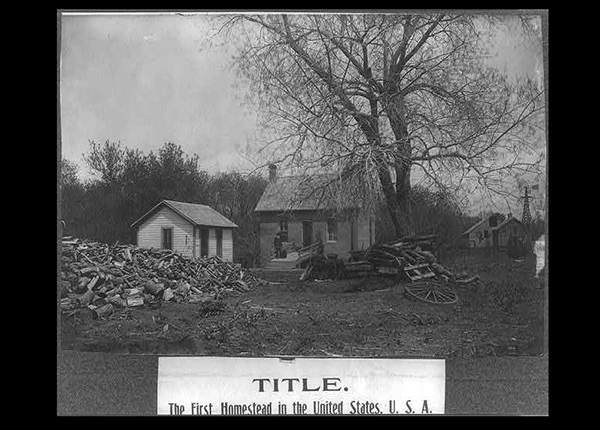Historic Document
Homestead Act, “An Act to Secure Homesteads to Actual Settlers on the Public Domain” (1862)
Congress | May 20, 1862

Library of Congress, Prints and Photographs Division
Summary
Although Abraham Lincoln’s Presidency is usually associated with the management of the Civil War, Lincoln also presided over a sweeping domestic agenda, which included public support for the creation of a transcontinental railroad and the creation of a national banking system. In so doing, Lincoln, although part of the anti-slavery Republican Party since 1856, was enacting much of the agenda of his political hero, Henry Clay, and the nearly-defunct Whig Party, to which Lincoln had long belonged. Chief among these initiatives was a Homestead Act, which converted the vast stretches of western lands owned by the U.S. government to private ownership. The Homestead Act opened federally-owned land in the West to any claimant willing, for little more than a filing fee, to occupy and improve up to 160 acres of land. Not only would this guarantee (in Lincoln’s words) “that every poor man may have a home,” but its provisions favoring U.S. soldier-veterans would legally preempt any future extension of slavery westward. The Homestead Act would allow 4 million settlers to file 2.5 million claims to 270 million acres (approximately 10% of the entire U.S. landscape).
Selected by

Allen C. Guelzo
Director, Initiative on Politics and Statesmanship, James Madison Program in American Ideals and Institutions, Princeton University

Darrell A.H. Miller
Melvin G. Shimm Professor of Law at Duke University School of Law
Document Excerpt
That any person who is the head of a family, or who has arrived at the age of twenty-one years, and is a citizen of the United States, or who shall have filed his declaration of intention to become such, as required by the naturalization laws of the United States, and who has never borne arms against the United States Government or given aid and comfort to its enemies, shall, from and after the first January, eighteen hundred and sixty-three, be entitled to enter one quarter section or a less quantity of unappropriated public lands, upon which said person may have filed a preëmption claim, or which may, at the time the application is made, be subject to preëmption at one dollar and twenty-five cents, or less, per acre; or eighty acres or less of such unappropriated lands, at two dollars and fifty cents per acre, to be located in a body, in conformity to the legal subdivisions of the public lands, and after the same shall have been surveyed: Provided, That any person owning and residing on land may, under the provisions of this act, enter other land lying contiguous to his or her said land, which shall not, with the land so already owned and occupied, exceed in the aggregate one hundred and sixty acres.
And be it further enacted, That the person applying for the benefit of this act shall, upon application to the register of the land office in which he or she is about to make such entry, make affidavit before the said register or receiver that he or she is the head of a family, or is twenty-one years or more of age, or shall have performed service in the army or navy of the United States, and that he has never borne arms against the Government of the United States or given aid and comfort to its enemies, and that such application is made for his or her exclusive use and benefit, and that said entry is made for the purpose of actual settlement and cultivation, and not either directly or indirectly for the use or benefit of any other person or persons whomsoever…and the purchaser shall acquire the absolute title by the purchase, and be entitled to a patent from the United States, on payment of the office fees and sum of money herein specified.
And provided, further, That all persons who may have filed their applications for a preëmption right prior to the passage of this act, shall be entitled to all privileges of this act: Provided, further, That no person who has served, or may hereafter serve, for a period of not less than fourteen days in the army or navy of the United States, either regular or volunteer, under the laws thereof, during the existence of an actual war, domestic or foreign, shall be deprived of the benefits of this act on account of not having attained the age of twenty-one years….




